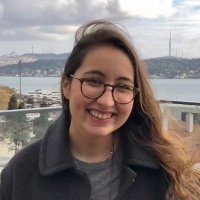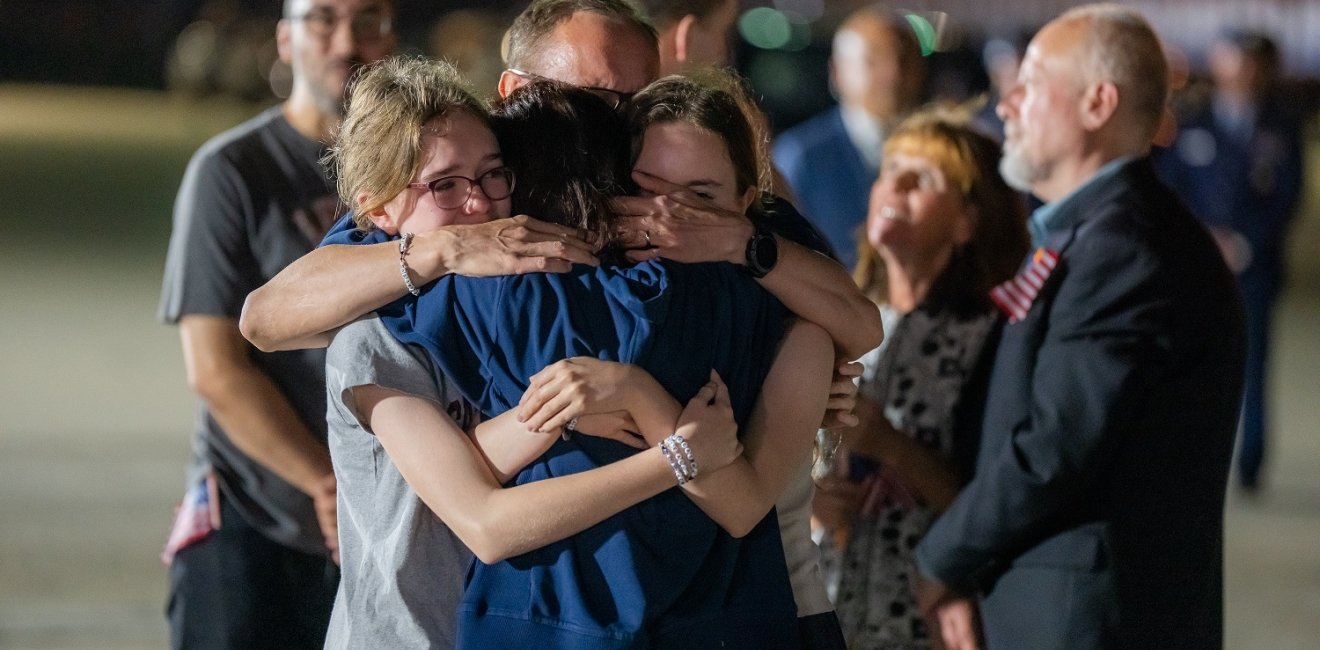
A blog of the Kennan Institute
After months of complex and delicate negotiations, American journalist Alsu Kurmasheva touched down in the United States on a plane carrying three Americans released in a historic prisoner exchange with Russia on August 1.
Held hostage in the Russian city of Kazan for more than nine months, Alsu had an emotional reunion with her family on the tarmac at Joint Base Andrews, only minutes before her youngest daughter Miriam's thirteenth birthday.
Alsu committed no crime and should never have been detained. As we breathe a sigh of relief for Alsu and her family, we continue the fight to secure the release of her three colleagues who are still behind bars, and stand in solidarity with all journalists who are imprisoned by Russia and its allies in retaliation for their honest reporting.
A Mockery of Justice
Alsu is a journalist with Radio Free Europe/Radio Liberty (RFE/RL), a congressionally funded, editorially independent media organization reporting the news in places where press freedom is under threat. Based in Prague, Alsu works for RFE/RL’s Tatar-Bashkir Service, covering cultural and human rights issues affecting ethnic minority communities in Russia.
Alsu traveled to Russia in May 2023 to care for her elderly, sick mother. She intended to stay there for only two weeks, but as she was getting ready to board a plane at Kazan airport, she was stopped and forced to turn over her U.S. and Russian passports. Authorities charged her with not registering her U.S. passport and later handed her a small fine.
She spent the summer under de facto house arrest in Kazan, eager to pay the fine and return home to Prague. Before she could, masked Russian agents showed up at her mother’s door on October 18, 2023, and took Alsu away. They charged her with failing to self-register as a “foreign agent” and then with “spreading false information” about Russia’s military, under draconian laws Russia uses to punish independent journalists.
Alsu spent nine months in horrid conditions, surviving the Russian winter in a cold, filthy prison cell and constantly getting sick. Following a rapid and secret trial, she was convicted and sentenced to six and a half years in prison on July 16, the same day that Wall Street Journal reporter Evan Gershkovich was sentenced to sixteen years on charges of espionage.
Alsu’s only crime was being an American journalist with a commitment to the truth.
Her forced separation from her loving family and colleagues was undeserved and cruel, and her treatment in prison was appalling. “I’m finally in good hands,” Alsu told RFE/RL several days after her release. “I’m being treated as a human being, finally, after this horrible, horrible ordeal.”
While we celebrate Alsu’s release, we must remember that Russia’s broader crackdown on the free press continues unabated, supported by its allies. Three of Alsu’s colleagues remain wrongfully detained in Russia-occupied Crimea and Belarus: Vladyslav Yesypenko, Ihar Losik, and Andrey Kuznechyk.
As we welcome Alsu home, we strengthen our commitment to their freedom and will continue to work tirelessly until they are returned to their families.
The jailing of RFE/RL journalists is part of an insidious trend. According to the Committee to Protect Journalists, Russia held twenty-two journalists behind bars in 2023 on charges ranging from criticizing the war in Ukraine to spreading “fake news.” Countless others have been forced to report from exile or stop practicing journalism entirely for their own safety.
“My Brain Almost Boiled”
Vladyslav (Vlad) Yesypenko, a journalist with RFE/RL’s Ukrainian Service, was detained by Russia’s Federal Security Service (FSB) in Russia-occupied Crimea on March 10, 2021. A Ukrainian citizen, Vlad left Crimea after Russia’s 2014 annexation but felt compelled to return periodically to report on social and environmental issues impacting the peninsula’s residents.
On February 16, 2022, a Russia-imposed court convicted Vlad of “possession and transport of explosives,” a charge he steadfastly denies. Prosecutors have since admitted that a grenade “found” in Vlad’s vehicle did not have his fingerprints on it.
During his trial, Vlad said he was tortured with electric shocks to extract a false confession. Recalling the torture, he said: “My eyes hurt and my brain almost boiled. . . . I was ready to sign anything.” He is currently serving a five-year sentence, separated from his wife Kateryna and ten-year-old daughter Stefania, who have not seen him in more than three years.
Russia’s Allies Test Its Playbook
Ihar Losik, a journalist with RFE/RL’s Belarus Service, was detained in Minsk on June 25, 2020, as part of mass arrests in the lead-up to Belarus’s rigged election in August 2020, which cemented Aleksandr Lukashenko’s Kremlin-backed dictatorship.
After a five-month closed-door trial, Ihar was convicted and sentenced to fifteen years in prison on baseless charges that included “organization of mass riots” and “incitement to hatred.” He was transferred to the notorious Navapolatsk hard labor colony.
Since his arrest, Ihar has endured severe psychological and physical pressure, including beatings, long-term solitary confinement, and several debilitating hunger strikes. He has been held incommunicado since February 2023, cut off from the outside world.
Ihar’s colleagueAndrey Kuznechyk is held in the same prison on equally unjust charges, but they are not permitted to speak to one another. An avid cyclist, Andrey was detained in Minsk on November 25, 2021, while returning home from a bike ride. Authorities ransacked his home and threw him in prison to serve two consecutive ten-day sentences for “hooliganism.”
That winter, Russia launched its full-scale invasion of Ukraine with Lukashenko’s support, while Andrey remained in detention on unspecified charges. The charges remained unknown until May 2022, when Andrey was accused of “creating or participating in an extremist organization.”
On June 8, 2022, Andrey was sentenced to six years in prison following a closed-door trial that lasted no more than a few hours.
Andrey is an innocent father of two young children. Because of Lukashenko’s persecution, he is kept from them and the rest of his loving family.
Journalism Is Not a Crime
These journalists were imprisoned not for what they did (or rather did not do) but for what they represent: a challenge to the false narratives peddled by the Kremlin and its allies. And they’re not alone—detentions of journalists in Russia are at an all-time high.
Authoritarians like Putin and Lukashenko seek to silence independent journalists committed to reporting the truth. Yet each attempt to silence members of the free press serves to underscore the importance of our mission.
RFE/RL remains dedicated to fighting for the truth and promoting democratic values by providing accurate, uncensored news and open debate in countries where a free press is threatened and disinformation is pervasive.
Every minute Vladyslav, Ihar, Andrey, and every other journalist imprisoned by the Kremlin and its allies are kept behind bars is time stolen from their families. We will not stop fighting for their freedom until they—like Alsu—can finally embrace their loved ones again.
The opinions expressed in this article are those solely of the author and do not reflect the views of the Kennan Institute.
Author


Kennan Institute
After more than 50 years as a vital part of the Wilson Center legacy, the Kennan Institute has become an independent think tank. You can find the current website for the Kennan Institute at kennaninstitute.org. Please look for future announcements about partnership activities between the Wilson Center and the Kennan Institute at Wilson Center Press Room. The Wilson Center is proud of its historic connection to the Kennan Institute and looks forward to supporting its activities as an independent center of knowledge. The Kennan Institute is committed to improving American understanding of Russia, Ukraine, Central Asia, the South Caucasus, and the surrounding region through research and exchange. Read more

Explore More in The Russia File
Browse The Russia File
Chechnya as a Model of Modern Russia

Russia’s Indigenous Communities and the War in Ukraine

Gas and Power in a Changing US–Russia Relationship

